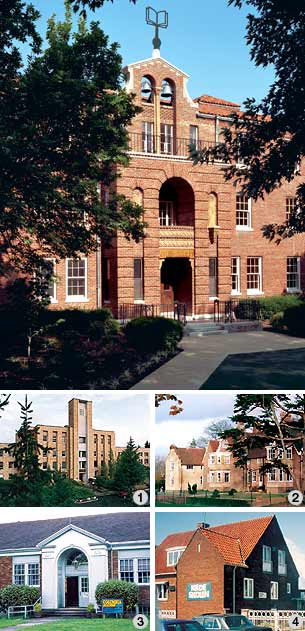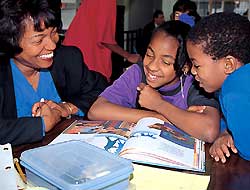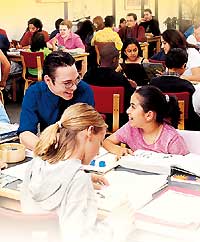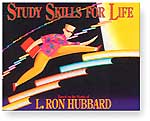Three-Pronged Attack on Learning Difficulties
Hubbard’s breakthroughs arm educators with a three-pronged attack on learning difficulties — and life — in the 21st century:
Here is the key to moving students more capably through their texts and studies, where he or she can become more causative over their learning rate and proficiency of real-life application. Here is where true interactive teaching meets responsible learning — and where both are not only a possibility but the norm.
A Fresh Education Philosophy
 FROM ITS NEW 100-ACRE HEADQUARTERS IN SPANISH LAKE, MISSOURI, Applied Scholastics International (above) licenses schools, community literacy centers and tutors that utilize |
“Test scores are the main tool to evaluate the quality and learning of a student,” Slaughter said. “So naturally, the stress in the current system of education is on passing tests.”
Slaughter noted that this has resulted, all too often, in students who succeed in school by merely becoming masters of cramming for tests. “Any actual remnants of learning that information is soon forgotten and there is little, if any, conceptual understanding of why they were studying the subject in the first place, let alone an ability to apply and use what is being ‘learned,’” she said.
“With our educational approach, however, the student does know his or her subject, and passing tests becomes a true measurement of what they have learned, not what they have memorized. We are the solution to comprehension, and thus to raising test scores, because our whole philosophy is geared around comprehension and application,” said Slaughter.
“The self-determinism of the individual must, above all things, be left as much intact as possible,” Hubbard stated in an August 1950 lecture on education. “He should not be asked to work or study because somebody other than himself decrees it.”
So much of education today is authoritarian in its approach — the sage on the stage presenting, imparting and enforcing predetermined knowledge upon students. Students find they must learn things that they feel have little relevance, value or impact on their lives. When one is “forced” to learn to pass a test to advance in school, one loses the true purpose and spirit of education, and the result is both mental, as well as physical, dropouts.
In discussing education, Hubbard recommended it be “... the science of how to learn and how to teach in such a way as to preserve the alertness of the [individual], and to make it possible for the individual to place into action a maximum of solutions based on a minimum of data.”
The question is, how can you achieve this with the current industrial model of education? The answer: you really can’t. U.S. Secretary of Education Roderick Paige made this point very clear: “The way we organize schools and provide instruction is essentially the same as it was when our Founding Fathers went to school.... We still educate our students based on an agricultural timetable, in the industrial setting, yet tell students they live in a digital age.”
The coming of age for 21st century education lies in the regimen that is implemented at schools using Hubbard’s methodology.
Real Tools for Learning
 TODAY, PROGRAMS USING THE HUBBARD LEARNING METHODS stretch across six continents — from the inner cities to the highest halls of learning and into schools where entire curricula are devoted to these methods. |
This, said Slaughter, is how Applied Scholastics so successfully bridges the achievement gap — that troubling inequity between schooling results of Caucasian versus ethnic communities.
Hubbard’s discoveries are quickly gaining widespread acceptance and recognition in the United States and abroad. As an official from the Sudanese education ministry recently observed, “Education is the gate to success. Study Technology is the key to that gate.”
Today, programs using the Hubbard learning methods stretch across six continents — from the inner cities to the highest halls of learning, and into schools where entire curricula are devoted to these methods. Since these techniques have application for anyone who studies and learns, Applied Scholastics programs are used by tens of thousands of educators in 54 nations. Applied Scholastics has delivered seminars and training courses to more than 64,000 teachers and educators, who have in turn trained 3.5 million students in the use of these educational methods.
“Try it for yourself, and call it what you will,” said Slaughter. “It works — and the current planet-wide education scene is suffering for lack of it.”
Near and far, educators highly recommend Study Technology’s effectiveness in every type of educational application.
These stories repeat themselves wherever
|
Help Others Understand What They Read and Hear
 Do you know people who could benefit from being able to better understand what they read and hear?
Do you know people who could benefit from being able to better understand what they read and hear?
You can help them with Study Skills for Life, a breakthrough book that helps resolve the underlying reasons why people can have trouble reading and writing at an acceptable level. “After studying the book, ‘Study Skills for Life’ by — Parvez Ahmed Butt  Buy Study Skills for Life today!
Buy Study Skills for Life today!
Hardback: $43.75 Softback: $19.95 Order online at www.able.org |

